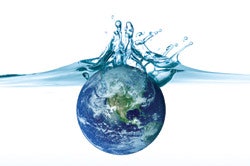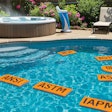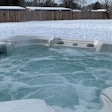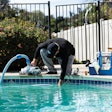
This heightened sense of environmental responsibility cuts across all facets of modern life, and it's gotten to the point where even the swimming pool industry is affected. Manufacturers, distributors, dealers and builders are finding their customers increasingly tuned into the green scene, and they're responding with an array of products designed to appeal to those customers.
"Are customers talking about green? You bet they are," says Scott Newton, marketing manager for BioLab, Lawrenceville, Ga. "And because consumers are talking about it, are manufacturers concerned about it? Well, if your customers are talking about it, then as a manufacturer you'd better be concerned about it.
"It's amazing how this whole phenomenon of green has gotten this much public awareness in a very short period of time. I applaud that; I think it's incredible. We're stewards of this planet and we're here for only a short time, but the generations to come are here forever.
"But we do have to treat the pools so that you don't put people in jeopardy or their investments in jeopardy."
Michael Moore, vice president of marketing for Advantis Technologies, Alpharetta, Ga., agrees, and says his customers are also more environmentally conscious than in previous years and that the company does what it can to ease people's minds about using chemicals in their pools.
"Yeah, I think watching out for the environment is an important trend. Any manufacturer or dealer of chemicals needs to be sensitive to that and aware of that," Moore says. "Fortunately, in the swimming pool industry, there are very few chemicals that are used in caring for pools and spas that would be considered harmful to the environment."
That concern and sensitivity is real, but chemical company executives like Newton are aware that there's only so much they can do to change pool sanitization chemicals themselves to align them with the green movement. If sprinkling rose petals into a skimmer basket killed bacteria, for example, everybody would be on board with it.
What's The Harm?
"Well, without chlorine or bromine, there would be a whole lot less people," Newton says. "And I believe that when used properly, chemicals are what they are and they do what they do: they kill and sanitize. They control and destroy bacteria in an environment where people are swimming, and that in itself is a protection of our most-valuable resource - people."
It's important, then, that dealers spread the word to their customers that used properly, chlorine and bromine are not going to harm the environment.
"People talk about chemicals being harmful to the environment," says Moore. "But I think, for the most part, those people are talking about petroleum-based products. Pool chemicals, and I'll get very specific here, chlorine and bromine, are naturally occurring elements and if used properly do no harm to the environment, to vegetation, to really anything.
"But you do always hear that, and it just comes down to a matter of education. It really does."
Dealer Education
Newton suggests dealers follow BioGuard's lead and emphasize reducing their overall impact on the environment.
"As manufacturers, we are always trying to be good stewards of the environment, whether it's through our manufacturing practices or packaging practices, safety, education, etc.," he says. "We're always working hard to do that. And when we talk to our dealers, we talk about ways to become green totally.
"So we talk to them about some of their practices. Do you really need to print everything? Are you running your service routes as efficiently as possible to reduce your carbon footprint? Are you ordering so often that you're causing people to keep running out to your store and wasting gasoline?"
BioGuard also looks inward at ways it can reduce its carbon footprint, Newton says. Shipping and receiving gets more attention than ever, and the location of distribution centers in relation to BioGuard's customers is carefully considered not only to reduce lead times, but also to reduce road time for its delivery trucks.
For his part, Moore says he encourages Advantis dealers to point out the company's reputation for responsible environmental practices to concerned customers.
He cites the numerous environmental awards Advantis has received, including Keep Georgia Beautiful, which is a waste-reduction category; the Governor's Award for pollution prevention from the Georgia Department of Natural Resources; and the Air and Waste Management Association's Best Hazardous Materials Management System in the state for a business its size.
"It just goes on and on, county awards, state awards, we're really big on those. We do a lot to take care of the environment.
"We manufacture all of our products here in Alpharetta, and our facility is operated as a zero-discharge facility. What that means is we don't dump wastewater, we don't dump chemical contaminants into the sewer system, we even reuse our rinse water. Dealers would be wise to tell their customers about these things. Absolutely."
Conservation System
Perhaps the best green message to spread about pools and chemicals is that if used regularly and in proper amounts, pool owners will use less chemicals than they would if they let things go a bit.
"We know that a pool that is run on a system basis, and the customer is attentive to the proper addition of chemicals for treatment and they don't get themselves into a bad situation where they have to catch up or solve a bad situation due to neglect, they're going to use less chemicals," Newton explains. "So we really push that system approach. For one, you're going to have better water. It's going to be better looking, it's going to be more comfortable, it's going to be better for your equipment and it's going to be less expensive."
Moore adds that mineral purifiers, which Advantis offers in its Leisure Time spa line, also allow customers to use less sanitizer and keep a lower level of chlorine and bromine in the pool. He's quick to point out, though, that minerals are not a replacement for sanitizers and should never be marketed as such.
Still, according to King Technology, which markets mineral systems under the Pool Frog and Spa Frog names, pool owners can keep chlorine residual at half the recommended level of 1.0 ppm for a stabilized pool using its products.
In the end, however, there's no getting around the fact that chlorine and bromine are necessary for keeping pools clean, and that customer apprehension about them should be dealt with directly and honestly. Simply put, use them correctly and you're doing nothing that's going to harm the environment. Use them too little and be prepared for dangerous water conditions requiring the addition of more chemicals than you'd have used to keep it clean in the first place.
As for whether all this means the chemical industry can claim green status, Newton raises an important question.
"What does green really mean?" he asks. "There are no standards to aspire to that I know of. But I can say that reducing your waste stream and advocating good practices for maintenance so you use less product can be considered green."
Seeing Clearly
Today's American consumers are crazy about recycling and buying recycled products. Things like recycled food and beverage packaging, sundry paper products and even apparel abound in the modern household and even extend out the backdoor, across the patio and into the pool.
SeaKlear's Natural Clarifier, which contains chitosan, or recycled crustacean shells, fits very well into today's consumer preference for earth-friendly products, says Mark Marcano, SeaKlear's national sales manager.
"The way we came up with the idea is that crabs, in their natural habitat, have a halo of clear water around them," he explains. "That helps them to hunt. The people in our labs created a product that utilizes that to make the pool cleaner.
"It's made of crab shells, shrimp shells, things like that. So No. 1, you're using a recycled product, and No. 2, since it's not petroleum-based, it actually pulls oils out of the water. And when you pull oils out of the water, your sanitizer works better because it's not trying to oxidize that debris, your filter is much cleaner, the tile line is cleaner and you extend your backwash cycles for your filter. So in general it has a lot of different things that are green about it, from how it's made, to what it does."
Though the product has always been green, Marcano says the company hasn't done a great job marketing SeaKlear that way.
"We just sort of assumed people looked at us that way," he says. "Now our message is that we've always been green. People are more and more concerned about what they're putting in their pool water, and they should be. If you can use less harsh chemicals and more green chemicals, that is good for everybody that's getting into the water."
- B.K.
The Green Seal of Approval
In addition to explaining the crucial and essentially harmless role basic sanitizers play in pool maintenance, Advantis Technologies does offer a couple of products its dealers can position as green. Three of the company's brands - Rendezvous, Applied Biochemists and Leisure Time - include citrus-based surface cleaners.
"They're made from the oils extracted from grapefruits, oranges and such," explains Michael Moore, vice president of marketing for the Alpharetta, Ga.-based chemical maker. "It's a very good cleaner, very good degreaser."
The cleaners have been around for about 10 years and weren't originally inspired by the green movement, but, according to Moore, they're effective and just happen to fit that green niche many people are attracted by.
"A citrus cleaner is certainly better for the environment than a soap-based cleaner," he adds.
Asked whether BioGuard brands any of its products as green, marketing manager Scott Newton says that unless the concept of "green" and how it would apply to pool sanitization is defined, he wouldn't be comfortable positioning chemicals that way.
"It would be lovely [to market chemicals with a green label], but we've got to make sure when we put that on there that it is what we say it is and that we truly understand what the definition of green is," Newton explains.
- B.K.











































